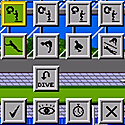|
There have been a few different times over the years when I read long articles explaining clever macros and got briefly excited about the idea of diving into Common Lisp, but each time I found the language too barbaric to deal with. The function names in Common Lisp seem to have no logic or uniformity at all and the ecosystem feels ancient. I'd be curious to try a more modern Lisp like Clojure but I've never had a personal project that fit.
|
|
|
|

|
| # ¿ May 14, 2024 03:45 |
|
weird posted:can you elaborate on both of those, i don't know what you're talking about I was talking a little out of my rear end since I didn't put much effort into learning Common Lisp, but all the built-in functions felt very old-school and weird to me, with lots of abbreviations and terminology I wasn't familiar with. That doesn't mean they're bad necessarily and I probably overstated saying they have no logic, but as someone new to the language I didn't understand why sometimes a common function would be a clear written out word like "concatenate" and other times a function would just be "elt" or "rplaca".
|
|
|
|
This may not be exactly what's being discussed, but lisp macros always seemed like some sort of arcane lost magic to me until I read this (lengthy) Common Lisp tutorial that walks through building a simple database with functions and then finally uses macros to make an SQL-ish language for writing queries to the database. I found the article so interesting that I briefly tried learning Common Lisp before realizing it's kind of ancient. I ended up trying Racket instead, which I enjoyed but had no real use for.
|
|
|



